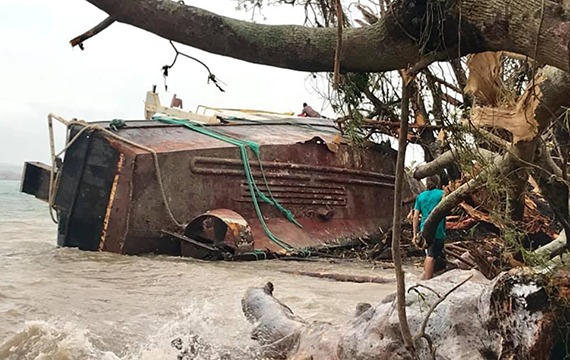
“Praise be to the God and Father of our Lord Jesus Christ, the Father of compassion and the God of all comfort, who comforts us in all our troubles, so that we can comfort those in any trouble with the comfort we ourselves receive from God.” – 2 Corinthians 1:3-4
As if dealing with COVID-19 was not enough, our Pacific neighbours in the Solomon Islands, Vanuatu, Fiji and Tonga faced a double emergency – the destruction of Category 5 tropical cyclone Harold and the spread of COVID-19.
Tropical cyclone Harold moved through the Pacific delivering heavy rain and 185-205km/hr winds, causing widespread damage to houses and infrastructure across the affected islands.
Reports came in saying hundreds of thousands of people were affected across the Pacific. Those with disabilities were particularly vulnerable.
In Vanuatu, aerial assessments reported damage to roads, hospitals, schools, homes and churches across the northern and central islands of Maewo, Pentecost, Ambae and rural Santo. Early reports from Luganville indicated that there was significant damage to infrastructure, that up to 70 per cent of buildings had sustained damage. In Sanma Province, it was estimated that between 80-90 per cent of the population had lost their homes, and approximately 60 per cent of schools and 20 per cent of health centres were likely to have been damaged.
At the time, just having enough food was of particular concern with many of the staple crops that supply the Pacific destroyed.
Water supplies became contaminated and there was an increased risk of water-borne disease.
Fears grew that people with disabilities were severely affected and may have missed out on early warnings about the cyclone.
People with disabilities were at risk of separation from their family care networks, and the assistive devices that give them independence.
As well as all this, the destruction of people’s homes meant evacuation centres become overcrowded and yet affected people had to stay there for an extended period.
You can make a difference and help ensure the protection and safety of people with disabilities, so no one is left behind or excluded in the emergency response.
By responding early your vital support will:
- provide equal access to food and basic needs for those with disabilities.
- teach people with disabilities how to reduce the risk of contracting COVID-19 and how to access support and services in the wake of destruction.
- ensure people with disabilities are heard and included as an active part of the response.
- help train emergency response personnel with knowledge and skills to deliver services to children and people with disabilities.
- promote accessibility to community services, food distribution, health centres, and water and hygiene facilities.
- help continue local home-based services and provision of replacement assistive devices.
- help link people with disabilities to income recovery programmes so they can bounce-back faster.
